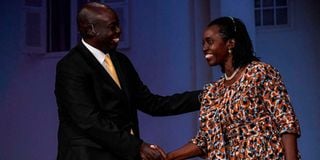Premium
Deputy as important as the president you’ll elect on August 9, choose wisely

UDA running mate Rigathi Gachagua with his Azimio la Umoja counterpart Martha Karua after the deputy presidential debate held at the Catholic University of Eastern Africa in Nairobi, on July 19, 2022.
What you need to know:
- A deputy cannot distance themselves without consequences. Power abhors a vacuum. It is in deputising that one is able to effect change from within.
- Your presidential vote automatically gives his deputy dormant powers. Choose wisely.
During his speech to name Martha Karua as his running mate, former Prime Minister and Azimio la Umoja leader Raila Odinga said: “History is calling on us to close the gender gap in our country. History is calling on us to reciprocate the struggles and fidelity of our women. History is calling on us to produce our first woman Deputy President.”
For the first time in Kenyan history, three remarkable women are in the running to deputise presidential aspirants.
Kenyan politics is taking slow but sure steps towards closing the gender gap. The women in politics are no longer flower girls.
There have been efforts to include women in government through nominations and appointments to Parliament and ministries.
The woman representative seats have been controversial as they are deemed, by some, mere tokens to the women associated with the men in power.
The Deputy President seat is an elective position for the second highest office in the country. With it comes vindication.
The fuss around the role of Deputy President is simply a politicised distraction.
The Constitution clearly defines Deputy President’s functions as those of an assistant who aids in the execution of the President’s role. Unambiguously, he/she is the presidential auxiliary. An understudy.
During the recent presidential running mate debate, Karua was the ever-stately lady.
She carried herself with poise and reiterated that her role was to complement Mr Odinga.
She was perceptive in her responses about her personal life while discernibly articulating Azimio la Umoja’s agenda.
The attempt to bait her into defending her convictions and principles failed. She fully understands what her role is.
Justina Wamae of the Roots party eloquently displayed her understanding of the role in the running mate debate.
She effectively outlined her party’s manifesto while elevating George Wajackoyah. She came out of the debate as well versed and inspirational.
Ruth Wambui was an interesting angle to the debate. She comprehends the role as that of bringing balance and making sure there is no gap in the executive for the citizens. She seemed genuine in her pursuit.
Playing the victim card
Deputy President William Ruto has been playing the victim card for years now.
The handshake between President Uhuru Kenyatta and Mr Odinga seems to have thrown him into a tailspin. Yet, he does not have to remain in the seat.
Contrary to the political babble witnessed on the campaign trail, the Constitution allows for the resignation of the deputy.
The Deputy President may resign from office at any time by notice, in writing, addressed to the President and the resignation shall take effect on the date and at the time specified in the notice, if any, or if a date is not specified, at noon on the day after the notice is delivered.
Should the deputy be disgruntled, he can leave office. The collective responsibility that comes with the presidential seat should not be up for debate.
A deputy cannot distance themselves without consequences. Power abhors a vacuum. It is in deputising that one is able to effect change from within.
Assuming, of course, that you truly want to positively change things. And that is why what Ms Karua said during the debate is true.
Those without principle cannot envisage resigning. Her counterpart’s counterargument, and one which has been used repeatedly by his principal in the presidential race, that they could not resign because their appointing authority is not the President but the voters of Kenya, is as hollow as they come.
Assuming, as they argue, voters are, indeed, the bosses and from their excuses again, Dr Ruto could not perform because he was sidelined from the government by the introduction of the Handshake and other players, isn’t it just logical that one steps down and tells the real employers that it was untenable to deliver?
In which case the employers can decide how to remove the obstacle(s)? All said the Constitution states that when the President is absent or temporarily incapacitated, and during any other period that the President decides, the Deputy President shall act as President.
This is crucial to remember as we head for the polls. Unlike the current situation, the president and the deputy are a package deal.
Your presidential vote automatically gives his deputy dormant powers. Choose wisely.
Ms Ngure is a strategic communications consultant; [email protected]




